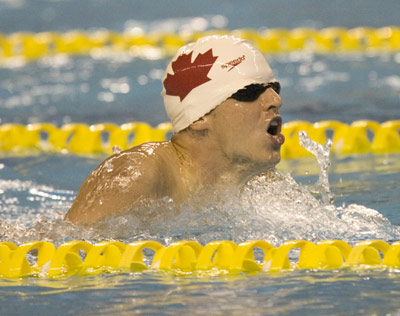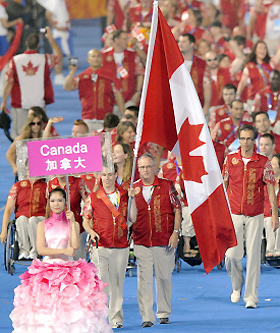 Donovan Tildesley in this undated file photo. Tildesley will compete in his third Paralympics in Beijing. [Canadian Paralympic Committee]
Donovan Tildesley in this undated file photo. Tildesley will compete in his third Paralympics in Beijing. [Canadian Paralympic Committee] |
Three-time Paralympian Donovan Tildesley says he feels the best ever mentally and physically for this year's Games.
But even up to a year ago the Canadian swimmer who is blind from birth wasn't sure if he was coming to Beijing.
The 24-year-old from Vancouver thought he had finished competitive swimming when Paralympic organizers pulled the 400 Freestyle event, his strongest, from the Games.
"It's my best chance for gold and if they took that out, there would be no point in competing," he said in a telephone interview with chinadaily.com.cn on Monday.
However, the event was put back in and Tildesley decided he'd give it one last shot.
"I thought 'I'll keep doing what I'm doing until December [2007], and if I still like what I'm doing, then I'll try for Beijing,'" he explains.
And in order to prepare for the 2008 Paralympics, Tildesley decided to change his training regime.
 Donovan Tildesley carries the Canadian flag as the members of the Canadian Paralympic delegation enters the National Stadium during the opening ceremony last Saturday night. [Agencies]
Donovan Tildesley carries the Canadian flag as the members of the Canadian Paralympic delegation enters the National Stadium during the opening ceremony last Saturday night. [Agencies] |
"A few years ago I didn't enjoy it [the training]… I felt like a machine," he explains. "I felt it was too serious and intense, not that I'm not like that now, but now I'm more relaxed and less panicky."
Although his father Hugh has coached him since 1999, the younger Tildesley felt he needed to go to the next level with more technical expertise.
Having his dad as his main coach, Tildesley enlisted the help of Kevin Johns, the brother of Canadian Olympic swimmer Brian Johns on improving his strokes, and worked with a weight trainer, a nutritionist and sports psychologist.
Now Tildesley admits he feels "almost overconfident" with his mental and physical preparation.
Although he has won two silvers and two bronzes in previous Games, this year Tildesley plans to go for as many personal bests as possible. Starting from Tuesday he will be competing in the 100m Butterfly, 400m Freestyle, 100m Freestyle, 100m Backstroke and 50m Freestyle.
"If you ask every athlete if they want to win a medal, they do, but for me it's not about the medals," he says. "All I can do is let the outcome take care of itself because you can't control how others are doing in the pool."
He explains that in his category called S11, where swimmers are totally blind like himself, the races are very competitive.
"Gone are the days when one person or one country would dominate," Tildesley says. "It's like a true Olympic meet. It's really competitive."
Although he has yet to race in the National Aquatic Center, Tildesley has enjoyed visits there so far.
When he first visited the Water Cube, he stood for a while at the starting block and then spontaneously kissed one of the blocks.
"Three weeks ago, Michael Phelps stood there with his bare feet and I hoped to get some of that energy and success," he explains. "Some of us swimmers are superstitious and who knows it if works or not, but lots of records were broken here."
But even if Tildesley doesn't win a medal, he equates the experience of being the flagbearer for Canada during the Paralympic opening ceremony as almost akin to winning a gold medal.
When the Canadian team was announced, a television shot of Tildesley showed him grinning from ear to ear, holding the red and white flag with the maple leaf.
"It was a proud moment," he recalls of Saturday night's gala event. "It was hard to decide who was louder – the crowd of over 90,000 cheering or the music."
He thought the ceremony was well put together and fantastic. But as a blind person, he says he would have liked there to have been more singing, even though the visuals, he heard, were amazing.
Nevertheless, Tildesley is looking forward to life after the Paralympics. He is already considering competitive skiing, and even tackling a triathlon.
But it's not just about sports either. He recently finished his Bachelor's degree in English Literature at the University of British Columbia after six years of study which he hopes will lead to getting more work and life experiences.
He hopes to eventually become a motivational speaker, which would enable him to travel.
"I'm in no rush to go on a certain path," he says. "I just want to move out and fall in love like any other 24-year-old. I just want to try out different things."